Alcyone and Ceyx
In Greek mythology, Alcyone or Alkyone (/ælˈsaɪəˌni/; Ancient Greek: Ἀλκυόνη Alkyónē derived from alkyon αλκυων "kingfisher") and Ceyx (/ˈsiːɪks/; Ancient Greek: Κήϋξ, romanized: Kēüx) were a wife and husband who incurred the wrath of the god Zeus.
.jpg)
Mythology
.jpg)
Alcyone was the daughter of King Aeolus of Aeolia, either by Enarete[1] or Aegiale.[2] She was a Thessalian princess and later queen of Trachis. Ceyx was the son of Eosphorus (often translated as Lucifer).[3]
Alcyone and Ceyx married and were very happy together in Trachis. According to Pseudo-Apollodorus's account, they often sacrilegiously called each other "Zeus" and "Hera".[4][5] This angered Zeus, so while Ceyx was at sea (going to consult an oracle, according to Ovid), the god threw a thunderbolt at his ship. Soon after, Morpheus, the god of dreams, disguised as Ceyx, appeared to Alcyone as an apparition to tell her of his fate, and she threw herself into the sea in her grief. Out of compassion, the gods changed them both into common kingfishers, or "halcyon birds", named after her.
Ovid[6] and Hyginus[7] both also recount the metamorphosis of the pair in and after Ceyx's loss in a terrible storm, though they both omit Ceyx and Alcyone calling each other Zeus and Hera (and Zeus's resulting anger) as a reason for it. On the contrary, it is mentioned that being unaware of Ceyx's death in the shipwreck, Alcyone continued to pray at the altar of Hera for his safe return.[8] Ovid also adds the detail of her seeing his body washed up onshore before her attempted suicide.
The myth is also briefly referred to by Virgil, again without reference to Zeus's anger.[9]
Halcyon days
Ovid and Hyginus both also make the metamorphosis the origin of the etymology for "halcyon days", the seven days in winter when storms never occur. They state that these were originally the 14 days each year (seven days on either side of the shortest day of the year[10]) during which Alcyone (as a kingfisher) laid her eggs and made her nest on the beach and during which her father Aeolus, god of the winds, restrained the winds and calmed the waves so she could do so in safety. Aeolus controls the wind and the bird couple can nurture their young nestlings.[8] The phrase has since come to refer to any peaceful time. Its proper meaning, however, is that of a lucky break, or a bright interval set in the midst of adversity; just as the days of calm and mild weather are set in the height of winter for the sake of the kingfishers' egglaying.
Interpretation
The English poet Robert Graves, in his The Greek Myths, explained the origin of Alcyone's myth as follows:
|
|
|
|
Although one of the mythological Pleiades was indeed called Alcyone, Graves does not cite any sources to support his claim that she was their leader - or even to support the idea that they had a leader. This claim is also made in Graves's The White Goddess, but again no quotations from myths or scholiasts are given to support it.
Gallery
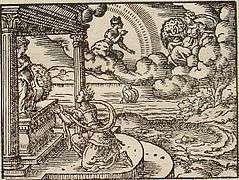 Alcyone praying Juno, engraving by Virgil Solis for Ovid's Metamorphoses Book XI, 573-582
Alcyone praying Juno, engraving by Virgil Solis for Ovid's Metamorphoses Book XI, 573-582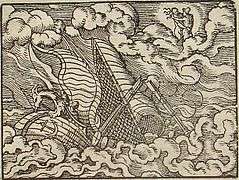 Ceyx in the tempest, engraving by Virgil Solis for Ovid's Metamorphoses Book XI, 410-572
Ceyx in the tempest, engraving by Virgil Solis for Ovid's Metamorphoses Book XI, 410-572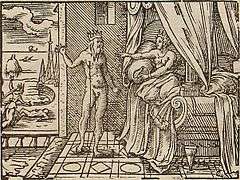 Ceyx/ Morpheus appears to Alcyone, engraving by Virgil Solis for Ovid's Metamorphoses Book XI, 650–749.
Ceyx/ Morpheus appears to Alcyone, engraving by Virgil Solis for Ovid's Metamorphoses Book XI, 650–749. Ceyx/ Morpheus appears to Alcyone, engraving (or etching more likely) by Bauer for Ovid's Metamorphoses Book XI, 633–676.
Ceyx/ Morpheus appears to Alcyone, engraving (or etching more likely) by Bauer for Ovid's Metamorphoses Book XI, 633–676.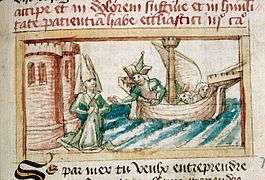 Ceyx prenant congé d'Alcyone (15th century)
Ceyx prenant congé d'Alcyone (15th century)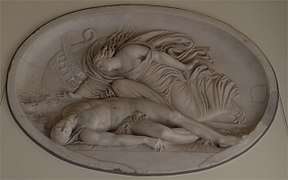 Alcyone and Ceyx marble bas relief, originally at Parlington Hall, Aberford, removed to Lotherton Hall sometime after 1905.
Alcyone and Ceyx marble bas relief, originally at Parlington Hall, Aberford, removed to Lotherton Hall sometime after 1905.
Legacy
- Various kinds of kingfishers are named after the couple, in reference to the metamorphosis myth:
- The genus Ceyx (within the river kingfishers family) is named after him
- The kingfisher family Halcyonidae (tree kingfishers) is named after Alcyone, as is the genus Halcyon.
- The belted kingfisher's Latin species name (Megaceryle alcyon) also references her name.
- Their story features in The Book of the Duchess.
- Their story is the basis for the opera Alcyone by the French composer Marin Marais and the cantata Alcyone by Maurice Ravel
- A collection of Canada's celebrated nature poet, Archibald Lampman, Alcyone, his final set of poetry published posthumously in 1899, highlights both Lampman's apocalyptic and utopian visions of the future.
- TS Eliot draws from this myth in The Dry Salvages: "And the ragged rock in the restless waters,/Waves wash over it, fogs conceal it;/On a halcyon day it is merely a monument,/In navigable weather it is always a seamark/To lay a course by: but in the sombre season/Or the sudden fury, is what it always was."
- Rick Riordan's The Demigod Files had a part called "The Diary of Luke Castellan" which mentions a similar character named Halcyon Green who is the son of Apollo and is currently under "house arrest" for revealing to a woman her fate.
Notes
- Pseudo-Apollodorus. Bibliotheca, 1.7.3
- Hyginus, Fabulae 65
- Ovid, Metamorphoses 11.271
- Pseudo-Apollodorus. Bibliotheca, 1.7.4
- Hesiod, Catalogue of Women fr. 15
- Ovid Metamorphoses XI, 410ff.-748 (also here Archived 2005-04-19 at the Wayback Machine)
- Hyginus Fabulae 65
- Roman, L., & Roman, M. (2010). Encyclopedia of Greek and Roman mythology., p. 55, at Google Books
- Virgil Georgics i. 399 - "[At that time] not to the sun's warmth then upon the shore / Do halcyons dear to Thetis ope their wings"
- William Smith, ed. (1867). Dictionary of Greek and Roman Biography and Mythology. Volume 1. p. 108.
It was fabled, that during the seven days before, and as many after, the shortest day of the year, while the bird ἀλκυών, was breeding, there always prevailed calms at sea.
- Robert Graves (1960). The Greek Myths. Harmondsworth, London, England: Penguin Books. pp. s.v. Alcyone & Ceyx. ISBN 978-0143106715.
References
- Hesiod, Catalogue of Women from Homeric Hymns, Epic Cycle, Homerica translated by Evelyn-White, H G. Loeb Classical Library Volume 57. London: William Heinemann, 1914. Online version at theoi.com
- Hyginus, Fabulae from The Myths of Hyginus translated and edited by Mary Grant. University of Kansas Publications in Humanistic Studies. Online version at the Topos Text Project.
- Pausanias, Graeciae Descriptio. 3 vols. Leipzig, Teubner. 1903. Greek text available at the Perseus Digital Library.
- Pseudo-Apollodorus, The Library with an English Translation by Sir James George Frazer, F.B.A., F.R.S. in 2 Volumes, Cambridge, MA, Harvard University Press; London, William Heinemann Ltd. 1921. Online version at the Perseus Digital Library. Greek text available from the same website.
- Publius Ovidius Naso, Metamorphoses translated by Brookes More (1859-1942). Boston, Cornhill Publishing Co. 1922. Online version at the Perseus Digital Library.
- Publius Ovidius Naso, Metamorphoses. Hugo Magnus. Gotha (Germany). Friedr. Andr. Perthes. 1892. Latin text available at the Perseus Digital Library.
- Publius Vergilius Maro, Bucolics, Aeneid, and Georgics of Vergil. J. B. Greenough. Boston. Ginn & Co. 1900. Online version at the Perseus Digital Library.

External links
| Wikimedia Commons has media related to Ceyx and Alcyone. |
- Smith entry
- Images of Ceyx and Alcyone in the Warburg Institute Iconographic Database